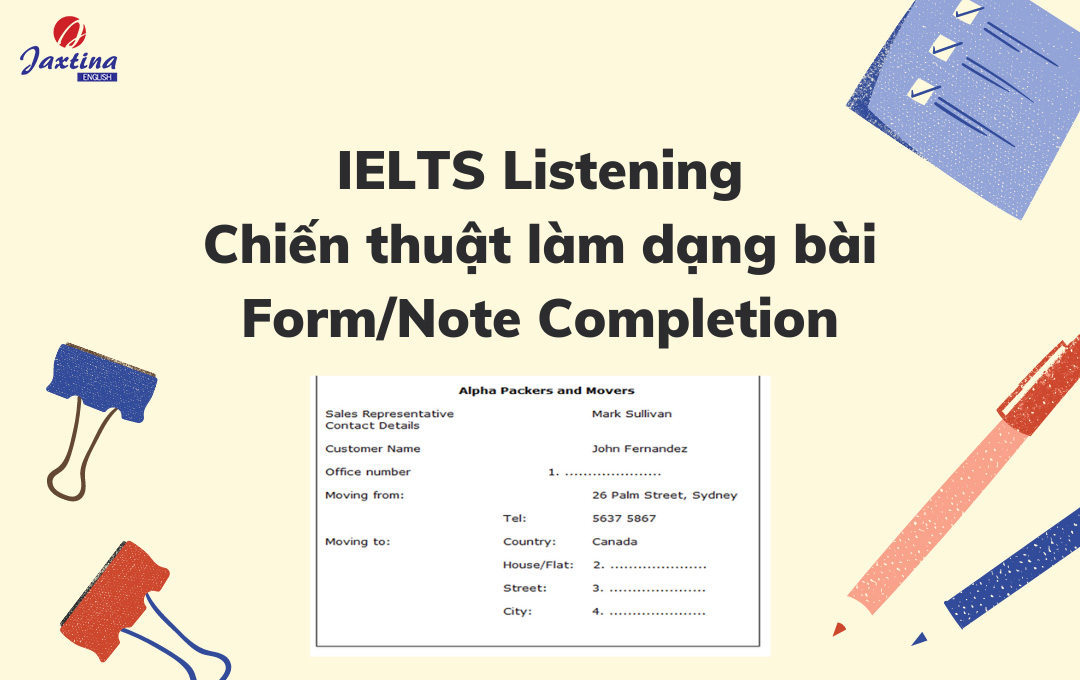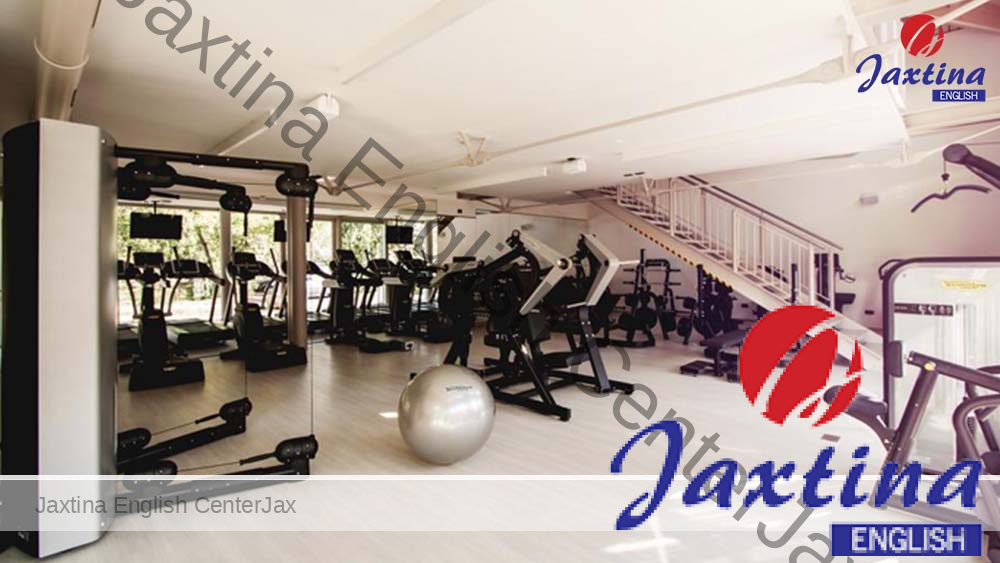Chiến thuật làm dạng bài Form/Note Completion IELTS Listening
Lỗi điền thiếu “S” cho danh từ số nhiều trong IELTS Listening
Bạn đã bao giờ cảm thấy khó chịu khi biết đáp án của mình sai chỉ vì điền thiếu s trong listening ielts? Đây là một lỗi sai kinh điển mà nhiều người hay mắc phải, đặc biệt là với các bạn ở trình độ cơ bản. Trong bài chia sẻ kinh nghiệm luyện thi IELTS dưới đây, Jaxtina sẽ chia sẻ cho bạn cách khắc phục lỗi điền thiếu “s” cho danh từ số nhiều của bài thi IELTS Listening.
Nội dung bài viết
1. Vì sao bạn lại điền thiếu hay thừa “s”?
Qua tổng hợp thì nhìn chung, việc các bạn sai trong bài thi IELTS Listeing thường nằm quanh ở một số lí do sau:
– Chưa nắm vững đâu là Danh từ đếm được (Countable Noun) & Danh từ không đếm được (Uncountable Noun).
– Chưa nắm vững hoặc còn nhầm lẫn việc khi nào thêm -s hay -es.
– Trường hợp nói nối âm khiến bạn không nghe ra có “s” hay không.
Có Thể Bạn Quan Tâm: Các dạng bài Listening IELTS
2. Cách khắc phục
a. Xét loại từ (Word form)
Trước khi nghe, một việc rất quan trọng để giải quyết các dạng đề này là xác định loại từ của chỗ trống. Nếu là danh từ thì sau khi nghe được rồi, bạn phải xác định đó là Danh từ đếm được (Countable) hay không đếm được (Uncountable). Để xác định được đúng đó là loại từ nào, bạn cần thường xuyên tra từ điển và note lại nghĩa cũng như loại từ của từ mới.
b. Xét ngữ pháp (Grammar)
Trước khi nghe, các bạn phải xác định xem các từ hay cụm từ trước phần chỗ trống có mạo từ (article) hay không. Các khả năng có thể xảy ra:
– Không có mạo từ (zero article): Nếu chỗ trống là danh từ đếm được thì khả năng số nhiều rất cao do đó phải thêm “s”.
– Mạo từ không xác định “a/ an” (indefinite article): Chắc chắn chỗ trống sẽ là danh từ đếm được số ít (singular countable noun), do đó tất nhiên không có “s”.
– Mạo từ xác định “the” (definite article): Chính trường hợp này gây bối rối cho các bạn học IELTS nhiều nhất, vì khả năng danh từ trong chỗ trống sau “the” có thể là tất cả các loại danh từ, do đó việc xác định có “s” hay không đôi lúc phải nhờ sự trợ giúp của các việc khác như dựa vào ngữ cảnh (context).
>> Có thể bạn quan tâm khóa học tiếng Anh cho người mất gốc
Ngoài mạo từ ra, còn 1 trường hợp mà các bạn phải để ý, đó là cụm từ đứng trước chỗ trống là:
– “There is”: Đi sau nó là danh từ đếm được số ít hoặc danh từ không đếm được nên không thêm “s”.
– “There are”: Đi sau nó là danh từ đếm được số nhiều nên phải thêm “s”.
Có Thể Bạn Cần: IELTS Listening ground floor plan of theatre
c. Xét ngữ cảnh (Context)
Nếu 2 việc trên vẫn chưa thể giúp cho các bạn xác định được là có thêm “s” hay không thì chúng ta phải nhờ trợ giúp bằng cách dựa vào ngữ cảnh của bài nghe để xác định và phán đoán.
Ví dụ: She loves hearing ______ of the war.
Loại từ: danh từ.
Văn phạm: không có dấu hiệu nào để biết là danh từ đếm được hay không đếm được, do đó có thể cả 2. Nghe được từ bài nghe là “thrilling story” hoặc “thrilling stories”, vì “story” là “countable noun” (danh từ đếm được). Để xác định, ta cần nhờ tới ngữ cảnh.
Ngữ cảnh: Cô ấy thích nghe những câu chuyện ly kỳ về cuộc chiến, như vậy không thể chỉ có 1 câu chuyện để nghe, mà phải có ít nhất một vài câu chuyện.
>> Đáp án: “thrilling stories”
Giờ thì bạn đã hiểu vì sao mình lại có thể điền thiếu “s” chưa nào? Hãy ghi nhớ những lưu ý trên và cùng làm một bài tập dưới đây để kiểm tra xem mình còn sai nữa không nhé!
Practice 1. Listen to the audio and do the following task below (Nghe đoạn audio và làm theo yêu cầu dưới đây.)
Questions 31-37
Complete the notes below.
Write NO MORE THAN TWO WORDS for each answer.
|
Source Plastic used as a flooring surface offers mixed 31 ____________ and has cheaper price than other 32 ___________ Before being used, material undergoes 32 _____________ Wood should be cut and 33 ______________ Stone should be cut and 34 ______________ Selection Aside from environmental factors, one should take 35 ____________ into account during construction. Some properties of materials affect mood, such as 36 ____________ , texture, and colour. Use a mathematical formula to choose the type of wood, because 37 ____________ are subjective, which are ambiguous in verbal description. |
Mời bạn xem thêm: khóa học luyện thi Ielts tốt nhất hiện nay
Xem đáp án
|
Hy vọng với bài viết trên, bạn đã có thể lưu ý rút kinh nghiệm cho mình và tránh mắc lỗi này ở những lần luyện tập sau này. Nếu bạn vẫn còn những thắc mắc cần giải đáp, đừng ngại ngần liên hệ với Jaxtina. Trung tâm Tiếng Anh Jaxtina tự hào tiên phong trong cách học đổi mới sáng tạo, giúp bạn tiếp thu kiến thức tốt hơn và hiệu quả với giáo trình được cập nhật liên tục và phương pháp dạy học tiên tiến trong việc giảng dạy IELTS chắc chắn sẽ giúp bạn đạt được số điểm mong muốn. Bạn hãy liên hệ ngay qua hotline hoặc đến cơ sở gần nhất của Jaxtina để được test trình độ và tư vấn lộ trình học IELTS hoàn toàn miễn phí nhé!
Jaxtina chúc bạn học tốt!
Nguồn bài nghe tham khảo từ: Section 4 – IELTS Recent Actual Test (May – August 2021)
Đừng Bỏ Qua:

Đơn giản hoá việc học tiếng Anh

Tiên phong đào tạo
tiếng Anh toàn diện 4 kỹ năng.









